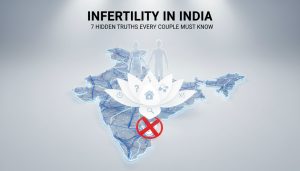IUI Process is one of the most safest and quickest option to cure infertility. There are many different medicines and procedures which may help to increase the chance to conceive. And this does not include any kind of medication, this is a procedure that can be done from home as well with a simple kit which you can easily get from Shubhag Health Tech; however, there are many people who are facing complications like PCOS and they are concern about the effectiveness for IUI Success. In order to understand such, let’s first discuss what is PCOS and effects of the same.
Here Is Everything You Need To Know About Pcos And It’s Effects On IUI Success Rate
What is PCOS?
PCOS is one of many reasons for infertility in women which decreases the chance of IUI success. It is the short form of Polycystic ovary syndrome. It is a common reason for infertility in women because of hormonal disbalance. Women with PCOS produce more male hormones, androgen compared to other women. It appears in women during their childbearing age, 15 years to 44 years. This causes an irregular menstrual cycle or total lack of menstrual cycle. Its side effects include an increase in facial hair and body hair. It can also cause baldness. In the long term, PCOS can lead to multiple health problems like heart diseases, and diabetes.
What happens in PCOS?
Polycystic ovary syndrome targets a woman’s ovaries, the reproductive organ. The ovary is responsible for producing the female fertility hormones, estrogen, and progesterone. These hormones regulate the menstrual cycle. But women affected with PCOS produce more male hormones, androgens than the necessary levels.
Women’s bodies release an egg each month that causes ovulation. Follicle-stimulating hormone(FSH) and Luteinizing hormone(LH) regulates ovulation. FSH stimulates the ovary to produce an egg every month. This egg is covered in a sac. The LH triggers the ovary to release an egg from any of the two ovaries. In women with PCOS, ovaries do not release eggs every month. This leads to the formation of small sacs inside the ovaries. The word polycystic means, “many cysts”. These sacs contain immature eggs that never mature enough to get released from the ovary.
The lack of regular menstrual periods alters the levels of estrogen, progesterone, FSH, and LH in the womens’ body. This causes an increase in androgen levels than usual.
Extra male hormones cause irregular menstrual cycles, so women with PCOS get fewer periods than usual.
Symptoms of PCOS
Irregular menstrual cycle- due to changes in hormonal levels, the uterine wall does not shed every month. Many women with PCOS get less than 7 periods in a year.
Cysts on the ovaries- immature eggs keep getting accumulated in the ovaries causing cysts.
Higher male hormones- androgen, a male hormone is produced in the body more than required.
Infertility- lack of ovulation, cause lack of menstrual cycle. This results in decreased fertility as sperms cannot fuse with eggs naturally. Even infertility treatments are of less help. IUI success rate, IVF success rate decreases considerably.
- The gain in weight- more than 80% of women with PCOS are obese.
- Acne- increase in male hormones causes oily skin, resulting in acne.
- Excess facial and body hair- increase in androgen level triggers excess growth of hair on body and face.
- Resistance to Insulin- women’s bodies become insulin resistant due to PCOS.
- Baldness- male- pattern baldness is witnessed in PCOS patients.
- Thinning of hair- the quality of hair on the head decreases causing an increase in hair fall, thinning of hair, and lack of new hair growth.
- Darkening of skin- dark patches can be seen on the body at different spots, like under breasts, on the neck, in the groin.
- Headache- change in hormonal level can trigger a headache.
How PCOS affects your body?
Having higher than normal male hormones in a woman’s body can affect fertility and many other aspects of health. It can also decrease the chances of IUI success and other fertility treatments if you are planning to have any.
Infertility
PCOS is one of the many reasons for women’s infertility but it is more common. To get pregnant, the ovaries have to ovulate but due to lack of regular menstrual cycles, infertility is induced in women.

Metabolic effect
More than 80% of women with PCOS suffer from overweight and obesity. Both obeity and PCOS increase the risk of high blood sugar level in the body, leading to insulin resistance. Other effects include high blood pressure, low HDL cholesterol (the good cholesterol), and higher LDL cholesterol (the bd cholesterol).
As an accumulated result of these, the risk of heart diseases, diabetes and stroke increases.
Sleep Apnea
This condition causes repeated pauses in breathing at night that disrupt sleep. It is more common in women who are overweight, especially those with PCOS.
Endometrial Cancer
During regular ovulation, the uterine lining sheds monthly. But due to the lack of regular menstrual cycles, the lining keeps on thickening.
A thickened uterine lining is also a reason for the increase in the risk of endometrial cancer.
Depression
Women with PCOS are on the verge of losing their fertility. Continuous weight gain, loss of hair on the head, growth of hair in unwanted places cause women to indulge in self-destruction thoughts leading to depression. It is common for couples with PCOS-affected women partners to face multiple failures of infertility treatments. The rate of IUI success, IVF, and other treatments decreases.
How is PCOS diagnosed?
Doctors go for PCOS diagnosis when two of these three symptoms are present-
- Higher androgen levels than normal
- Irregular menstrual cycles, less than 8 cycles in a month
- Presence of cysts in ovaries.
- Other minor symptoms include acne, hair loss, baldness, excessive hair growth on the face and body, excess and rapid weight gain
Diagnosis is done by different Techniques
- Pelvic exam- it can look for any issues with the ovaries or other reproductive parts. In this test, a doctor inserts gloved fingers into the vagina to check for any extra growth in the ovaries and uterus.
- Blood tests- blood tests are done to examine normal than usual levels of male hormones. One can also have blood tests to check cholesterol level, insulin level, and triglyceride levels to evaluate the risk of related health conditions like heart diseases and diabetes.
- Ultrasound- it uses sound waves to look for growth of abnormal follicles and other related problems with the ovaries and uterus.
PCOS and Mental health
The feeling of motherhood is a dream of every woman. There comes a time in a woman’s life when she feels the need for a baby. Womanhood is incomplete for many women without motherhood and this is the cause of mental turmoil for the majority of women.
During the age of fertility, it is common nowadays for both men and women to experience infertility due to various reasons. This finding brings with it shock, guilt, and unhappiness. Though couples seek medical help in this it is not always helpful or as per the need of the couples. PCOS is itself the main factor to induce depression and when it gets paired with decreased or zero rates of IUI success and IVF success, it brings havoc in the life of the woman.
PCOS and Infertility
If you are also suffering from PCOS, you may have a difficult time getting pregnant. The increased level of male hormones prevents regular ovulation and leading to infertility.
Chances of conceiving can be increased by-
- Weight monitoring- maintaining a healthy weight in proportion to your height and age shows a significant increase in improving chances of conceiving. For obese women, even a loss of 5% to 10% of weight in obese PCOS patients can prove helpful.
- Healthy diet- taking a low glycemic index (low-GI) diet that gets most carbohydrates from fruits, vegetables, and whole grains can be helpful to regulate the menstrual cycle better than a regular weight loss diet.
- Regular exercise- working out 30 minutes a day or daily walking can cure the imbalance of hormones.
- Monitoring ovulation and scheduling intercourse during the fertile window period.
- Taking common medical treatments;
- to bring back the normal menstrual cycle, birth control pills and other hormonal medicines are helpful. They treat PCOS-related symptoms like excessive hair growth and acne.
- Taking birth control pills like estrogen and progestin daily can restore the hormone levels, regulate the menstrual cycles, control symptoms like excess hair growth, and protect from endometrial cancer. These hormones are available in the form of pills, patches, or vaginal rings.
- Metformin is a type of drug administered to treat type 2 diabetes. It is also effective in treating PCOS by improving insulin levels in the blood.
- Clomiphene is a type of fertility drug. It helps women with PCOS to get pregnant. Though the risk of twins and multiple triplets increases.
- Surgery is the last option to cure PCOS when all the other options have failed.
PCOS and Infertility treatments
It is very common for women with PCOS to face infertility. However, there is always a good chance for women with PCOS to conceive. Patience and dedication towards infertility treatments are key to successful treatments., IVF success, and other treatments also. Even a healthy lifestyle that includes regular exercise, yoga, meditation, and healthy food habits proves to be helpful in conceiving naturally.
When needed, the infertility treatments paired with appropriate medications increase the chances of conceiving too many folds. With proper treatments, PCOS can be controlled and its symptoms can be reduced to nothing.
IUI success is high for these candidates
Inseminating siemens collected freshly from the male partner or taken from a semen bank increases the chances of conceiving when compared to the natural method of intercourse. Through artificial techniques, the chances increase of conceiving to many folds. IUI success depends on the cause of infertility and it is considered to be beneficial for many patients. Though it is not necessary that the patient will conceive after the first IUI cycle itself, multiple cycles increase the rate of IUI success. The candidates who should choose IUI as an infertility treatment are;
- Female partner with unsupportive cervical mucus
- Male candidates with mild to moderate infertility issues
- Female candidates with a lack of ovulation
- PCOS patients
- Couples with unexplained infertility issues.
IUI is not the only option for every couple who has infertility. Infertility causes are different and hence they ask for different treatments. IVF, surrogacy, adoption are also other proven treatments for infertility.
IUI success and PCOS
PCOS, polycystic ovary syndrome is a cause of infertility in women. However, women with PCOS also are considered superb candidates for the treatment of intrauterine insemination with higher IUI success rates than patients with other infertility issues. The success rate for the patients of PCOS for fertility is way better than the others. IUI success rate for PCOS patients increases many folds when administered with gonadotropins. It has a success rate of around 14%-26% per cycle.
PCOS and pregnancy
Pregnancy is the highest expectation of every couple who is trying to conceive. Delivering a healthy baby is the ultimate gift for every expecting parent. PCOS can increase your risk for complications during pregnancy. Women with PCOS need special attention before and during their gestation period to keep the baby healthy.
It increases the chances of spontaneous abortion, high blood pressure induced because of pregnancy, diabetes during pregnancy, and premature birth of the baby. Women with PCOS are more likely to require cesarean delivery than women with other complications during delivery. This may be because of the larger size of the baby. Women who have PCOS have higher chances of getting admitted to ICU. The risk of dying while giving birth is also higher for them.
PCOS patients should remain in continuous connection with their doctors throughout their pregnancy. Controlling the unwanted symptoms that affect the baby or the to-be mother need to be taken care of. During pregnancy also, regular exercise, meditation, yoga, and a healthy diet are recommended for the good health of the mother and the baby.

IUI success story
Don’t give up, hold onto your hope.
My successful IUI story is a miracle in itself. I have undergone several IUIs before this one proved to be the one. We were trying to conceive for the last 3 years. Once, our friends told us about the IUI. In the beginning, we were very skeptical about the results and after 3 failed IUIs we lost all hopes. Our fertility expert told us to go for more IUI as couples of our age are advised to undergo 4 IUI cycles before switching to IVF. One morning, I gave my husband this happy news, and today we have a daughter of 5 years old. She has changed our lives completely and we are more than glad that we took our 4th IUI.
PCOS and IUI, my story.
I am a patient with Polycystic ovary syndrome. I have lived a life of ignorance for 10 long years before accepting the fact that my fertility is getting affected. We tried everything to conceive naturally but in the end, nothing proved to be of any help. I consulted an infertility expert on the suggestion of my relatives and to our surprise we got pregnant. My twins are perfectly healthy and their smiles light up our days.
Our babies are Science babies.
After 2 failed IUIs, finally we are parents to 3 healthy and beautiful babies. I am a working woman of 38 years. At the age of 33, I decided to get married and at 35 we decided to start a family. My age was the greatest obstacle for my pregnancy. We knew our stats of getting pregnant. Without any delay, we went for IUI after failing to conceive naturally for 2 years. Due to hormonal medications, I delivered triplets but we are happy for our growing family.
Our successful IUI, our miracle story.
Our 5th IUI proved to be our IUI success story. After facing failure from every door that we knocked, we lost all hopes. My husband’s sperms were weak and we did not want to go for a donor. We have taken every medicine that our expert prescribed to us and finally one day we were pregnant. We cannot put our happiness in words and the feeling of parenthood cannot be compared to any feeling in this world. We are thankful to our infertility expert and IUI for our successful IUI story.
IUI is a boon for us, our IUI story.
We are a same-sex couple. For a long time, we were fighting with the stigma of never being able to get pregnant. One day we decided that parenthood is more important to us than any criticism. People have already tried a lot to snatch our happiness because we are different from them. But when it came to experiencing this beautiful emotion, we both decided to lend a deaf ear to the world. Our first IUI proved to be our successful IUI story. Millie and I are both happy parents to a handsome boy. We have named our baby after the rays of hope.
We are parents, finally!
Till last year we had only heard about magic but when our beautiful twins arrived we were sure that magic is real. We have lived in the hope of a child for 5 long years. Every day we searched on the internet for how we can get pregnant but nothing worked. Last year we read about at-home insemination and we thought to give it a try. The instructions that came with the kit proved to be of extreme help to us. This lockdown has proved to be fruitful for us.
IUI success and PCOS are not alien concepts today. It is understandable that PCOS may affect the IUI Sucess rate; however, that being said, many women having PCOS have undergone IUI and got pregnant after 2 or 4 IUI cycles.




